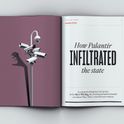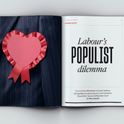Too powerful, too political
Tom Clark and Alex Dean (“Judges in the dock,” March) are wrong to argue that the scope of judicial power in our constitution does not require reform.
The Human Rights Act 1998 politicises adjudication and undermines legal certainty. Judges are increasingly willing to misinterpret legislation, departing from its intended meaning, and the law of judicial review is too often “politics by another means,” to quote Lord Justice Singh. In some cases judges have even openly questioned parliamentary sovereignty.
This is a constitutional problem that requires attention. My recent paper, “Protecting the Constitution,” makes this case in more detail and recommends reform of human rights law, legislation in response to particular judgments, and changes to the Supreme Court’s institutional structure.
Clark and Dean object to the paper’s proposals in relation to judicial appointments. But encouraging the Lord Chancellor to exercise his existing powers, or enabling him to choose from a shortlist, would not undermine judicial independence. It would be a modest but important change, bringing us more closely into line with Australia, Canada and New Zealand.
Richard Ekins, Associate Professor, University of Oxford and Policy Exchange’s Judicial Power Project
Most of the criticism of the courts in recent times has revolved around their approach to rights litigation, obviously more of a feature since the Human Rights Act, often on the basis that it necessarily involves the weighing of competing moral values.
They also use the Miller rulings to make their case. But those were very different, involving what I call the structural constitution—its ground rules and basic institutional set-up—and in fact they added a new layer to centuries-old jurisprudence.
It helps for opponents of the courts to bundle all this together. But they should be called on to explain—even if we grant them the curtailing or eradication of rights litigation—what they would like to see done in respect of the structural constitution. Do they sincerely want to see it as a politics-only zone? Then we really are in Hungary or Poland territory.
Thomas Poole, Professor of Law, London School of Economics Statistics 101
Anne Case and Angus Deaton make a powerful argument in railing against many of the injustices in the modern world (“Putting the Gini back in the bottle,” March). But they take their argument too far with the criticism of the Gini index. It is irrelevant that Signor Gini had unpleasant views. All summary statistics leave out information— they are, by definition, a summary.
The authors highlight the stability of the Gini as a measure of income and wealth inequality (something that is replicated by most other comparable indicators), but that does not tell us the Gini is wrong, nor does it imply the same people do not care about deaths of despair, dashed expectations or left-behind people or places. The stability of inequality measures should always be described in context—and criticism of the Gini itself does not help that necessary nuanced debate.
Chris Giles, Economics Editor, Financial Times The nuclear option
Adam Tooze’s piece (Two countries, one planet,” January/February) misses the obvious point that the biggest difference between UK and German energy policy is the UK’s sensible decision to keep nuclear stations running and to invest in new plants. Germany’s incumbent industry chose coal over nuclear, Fukushima providing the political cover for a decision which flew in the face of rising air pollution and global climate chaos.
To match the lifetime output of a nuclear station you need to build three times more solar and wind infrastructure and replace it all at least twice. Progress on electrification in other sectors will require yet more zero-emissions power generation and nuclear can play an important part in this. It’s not too late for Germany to change its mind; it still has nuclear stations running and the obvious solution is to not shut them.
Bryony Worthington, environmental campaigner and Labour peer The measure of Mutti
It may be that, as Philip Oltermann notes (“Who was Angela Merkel?”, March) the German chancellor lacks charisma, is indecisive and will leave no ideological legacy.
But she is a formidable political operator. She was an outsider in her party (woman, Ossi, divorced, Protestant, scientist) when she became its surprise leader in 2002 and had no power base of her own. Nonetheless she soon marginalised all her potential rivals and gradually destroyed the opposition: in the 2005 election the CDU and SPD were neck and neck, by 2017 the CDU was 12 points ahead. The quest to find a suitable successor has proven arduous.
Germany’s power in Europe reflects the strength of its economy, not the personality of its chancellor. But perhaps we were lucky that for 15 years it has been exercised by Mutti, and not by an alpha male.
Paul Lever, former UK ambassador to Germany Tax trickery
Emmanuel Saez and Gabriel Zucman are right to want multinationals to pay their share (“Companies paying their taxes,” January/ February). They are concerned about saving globalisation from political assault, but the case for what they propose is more powerful than that.
It is shocking that whereas global companies can arrange to pay virtually nothing, local companies pay the full rate of corporate tax, which is necessarily higher that it would otherwise be. Inadvertently, governments have permitted fancy lawyers to create scale economies in rent-seeking: the “double Irish” trick (in which transactions disappear for tax purposes) can be performed for a global company but not for a local firm. This is detrimental on the criteria of both efficiency and fairness. Yet it is what we will get if governments persist in passivity under the false impression that they are impotent.
Paul Collier, economist at the Blavatnik School of Government, University of Oxford Matter of fact
Theresa May’s former director of communications Robbie Gibb (“Can fact-checking help save politics?”, The Duel, March) misses the opportunities that fact-checking offers to government and the media.
At Full Fact we publish what we find: sometimes we expose serious false claims, sometimes we show that politicians’ claims can be trusted despite opponents’ allegations, and sometimes the results are detailed and not dramatic.
Too often we reveal that the government doesn’t have the quality of information it needs. Bad information on health risks lives; bad information on education risks futures; and bad information on the economy can cost billions. People at the centre of government should be acting on these warning signs: good policy needs good information.
Will Moy, chief executive, and Amy Sippitt, head of research, Full Fact Philosophic kinship
Regarding Clare Carlisle’s essay (“The philosophy of George Eliot,” March), Eliot’s mind was always full to the brim and her early career as a translator took her deep into the experience of writers to whom she felt kin. Translating makes her the companion and even the embodiment of Spinoza: his insistence on the community of emotion and analysis is liberating for her as a writer. His work also rouses terrors: early in her
career, in her short story “The Lifted Veil,” she imagines a man, Latimer, who can see into the future but also into the consciousness of others, as a novelist must do. But in these consciousnesses Latimer discovers only paltry spite; perhaps she feared that the philosophic sympathy that Spinoza taught would uncover only triviality when she turned to fiction.
Gillian Beer, literary critic Climate catastrophising
Hephzibah Anderson (“A climate for kids,” March) says potential parents must consider “not only the harm that adding another human bring will do to the world, but also the ways in which the world might imperil them.”
She completely ignores the fact that people also add value of all kinds, economic and social. We can solve climate change, and it will be future scientists and engineers who will solve it. Not having kids because of climate change seems very short-sighted.
Robert Scarth, via Facebook
Anderson’s article is a phenomenal example of over-thinking. If you want to have children and can afford to give them a reasonable life, have them. If not, don’t. Good grief.
Caroline Miley, Melbourne
In fact In 2018, Britons spent £1.7bn on greetings cards, with 18 to 24-year-olds buying more cards than any other age group. Guardian, 13th February 2020 Nobody born blind has ever been diagnosed with schizophrenia. Vice, 11th February 2020 In 2019, Aeroflot was the world’s most punctual major airline, with 86.7 per cent of its flights arriving on time. Moscow’s Sheremetyevo International was the world’s most punctual airport, with 95 per cent of flights departing on time. Independent, 2nd January 2020 Donald Trump received 129,696 votes in the 2020 New Hampshire primary, double the total of Barack Obama or George W Bush at that point in their re-election campaigns. Politico, 16th February 2020 The tradition of the Olympic torch relay was invented in Nazi Germany for the 1936 Games. Wikipedia 74 per cent of UK pet owners play music for their animals. Music Week, 15th January 2020 Harriet Beecher Stowe (author of Uncle Tom’s Cabin) was the first person to publicly accuse Lord Byron of incest, in an Atlantic Monthly article in 1869; the scandal lost the magazine a third of its 45,000 subscribers. Decoder Ring, 3rd February 2020
In fact In 2018, Britons spent £1.7bn on greetings cards, with 18 to 24-year-olds buying more cards than any other age group. Guardian, 13th February 2020 Nobody born blind has ever been diagnosed with schizophrenia. Vice, 11th February 2020 In 2019, Aeroflot was the world’s most punctual major airline, with 86.7 per cent of its flights arriving on time. Moscow’s Sheremetyevo International was the world’s most punctual airport, with 95 per cent of flights departing on time. Independent, 2nd January 2020 Donald Trump received 129,696 votes in the 2020 New Hampshire primary, double the total of Barack Obama or George W Bush at that point in their re-election campaigns. Politico, 16th February 2020 The tradition of the Olympic torch relay was invented in Nazi Germany for the 1936 Games. Wikipedia 74 per cent of UK pet owners play music for their animals. Music Week, 15th January 2020 Harriet Beecher Stowe (author of Uncle Tom’s Cabin) was the first person to publicly accuse Lord Byron of incest, in an Atlantic Monthly article in 1869; the scandal lost the magazine a third of its 45,000 subscribers. Decoder Ring, 3rd February 2020













